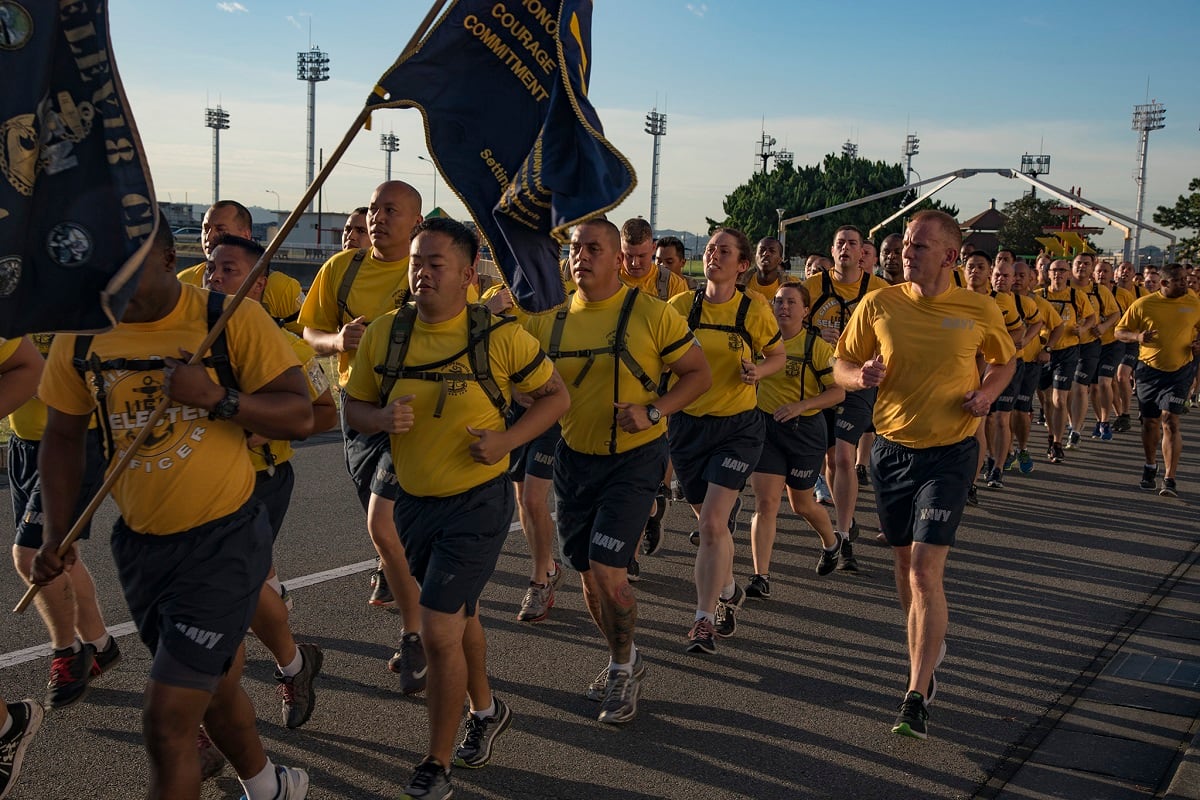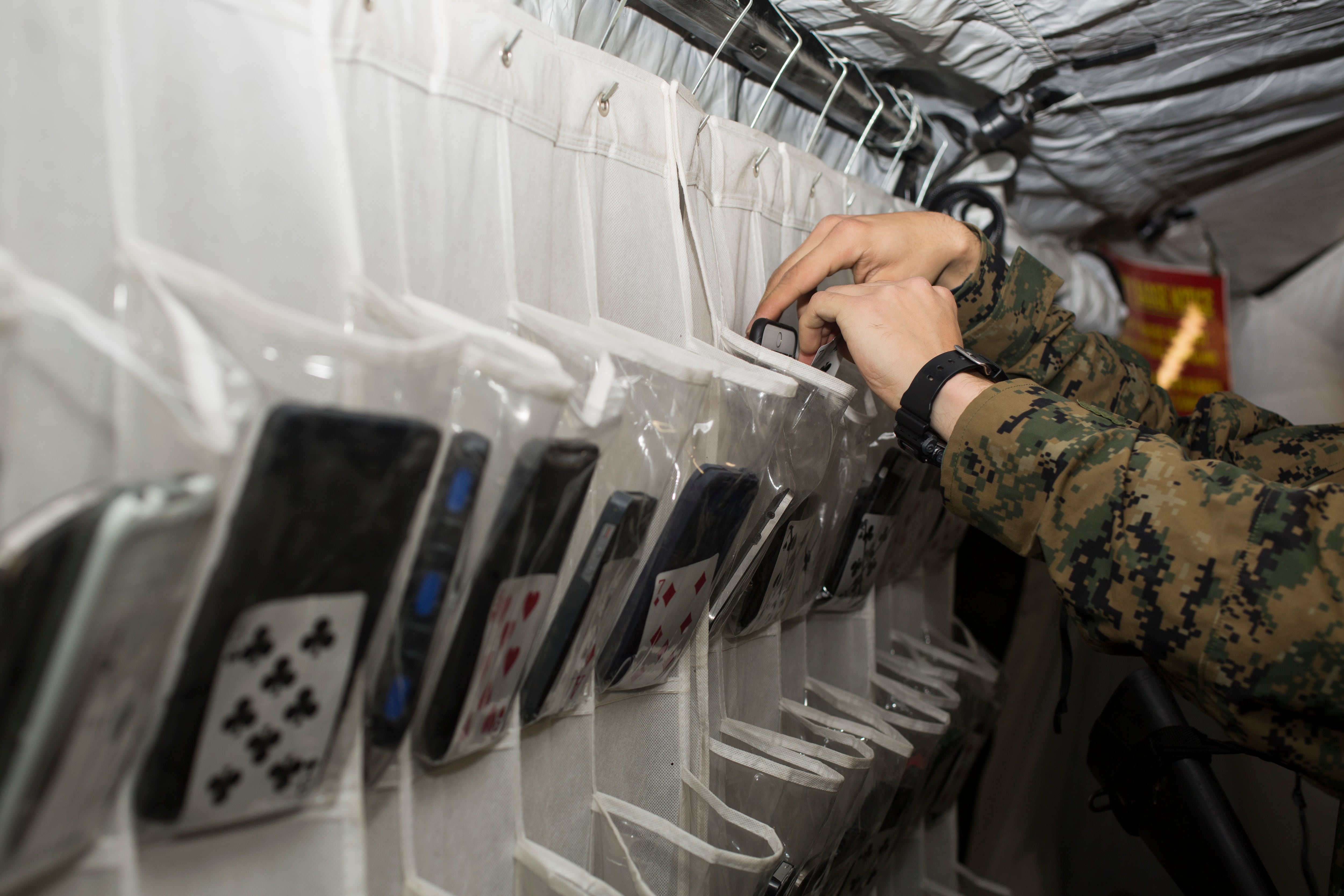The Marine Corps has banned Marines from using personal cellphones and other devices during training exercises, armed duty, high-risk training and aviation operations.
Previous guidance on personal portable electronic devices — a category that includes cellphones, laptops, tablets, smart watches, portable gaming systems, digital cameras and Bluetooth headphones — had given unit commanders more leeway to set their own policies. But a Marine Corps order dated March 26, signed by Commandant Gen. Eric Smith, tightens the service-wide rules about the devices, citing a host of risks the technology can cause.
The order comes as part of a broader effort by the Marine Corps to rein in Marines’ use of personal electronic devices at work.
Personal portable electronic device use “can reduce situational awareness, compromise privacy, and threaten operations security,” the order states.
The order tells commanders to issue unit-specific policies that align with the Marine Corps’ new restrictions.
Under the new rules, Marines conducting training exercises in the field “should not” carry personal devices. Commanders may authorize “limited” use of the devices in the areas where Marines have set up their temporary camps.
Marines who are standing armed duty can’t carry personal devices, the order states. Nor can Marines carry them during “high-risk training events” — such as live-fire training, water survival training, obstacle courses or rappel training — regardless of whether they are receiving or administering the training.
Operators and crew members of government-owned vehicles and equipment are barred from device use “that creates unreasonable risks to mission or good order and discipline while operating such vehicle/equipment.”
Personal devices are prohibited from areas “actively involved with Marine Corps aviation operations,” meaning hangars, flightlines, aircraft maintenance spaces, briefing areas and aircraft.
The ban on device use during aviation operations comes with some exceptions. Aircraft passengers who aren’t members of the crew may use their devices with approval from the aircraft commander. Aircrew members who don’t have government-issued devices may carry powered-off personal devices as a last-resort form of communication for emergencies.
The order allows commanders of battalions or larger organizations to set temporary, situation-dependent exceptions to the rules, but commanders can’t make permanent exceptions based on billet, rank or seniority.
The Marine Corps wants a “cultural shift” in how Marines use devices, according to the order. Leaders are expected to teach their Marines about the risks posed by devices and use tools to monitor device emissions.
When Marines break the new rules, commanders are required to report the violations and deal with them as they see fit.
Yet the order urges a gentle approach to enforcement: “Where applicable, commanders are encouraged to use PPED violations as learning/training opportunities to both educate on the operational risks of PPEDs, while providing Marines the opportunity to learn from their mistakes without derailing their future career.”
The order does not apply to Marines’ official government-issued devices.
The Corps’ previous guidance on personal devices, a 2016 white letter from then-Commandant Gen. Robert Neller, had restricted device use during live-fire training, swim training, and vehicle and aircraft operations but otherwise had left it up to commanders to make their own rules.
No texting for official business
The order from March is the second time in recent months the Corps has restricted Marines’ use of personal devices.
The service announced in a Marine administrative message in December 2023 and reiterated in a Marine Corps bulletin in February that Marines had to use their Microsoft Teams accounts or government emails for official business. That means Marines aren’t allowed to transmit official information via text, even on their government-issued devices.
When Marines “inadvertently” do business on their personal devices, they must screenshot the content and send it to their own government email accounts with the subject line “Official Record of Text Messages,” the bulletin states.
Official business includes “Any contact with a media outlet by any member of the United States Marine Corps (USMC) acting in an official capacity,” according to the bulletin.
In February, Marine Corps Times asked the office of Deputy Commandant for Information Lt. Gen. Matthew Glavy if that meant Marine public affairs officers providing information on background or junior Marines discussing the dire conditions of their barracks would have to disclose their communications with journalists to records officials.
More than a month after receiving that query, Capt. Karen Jensen, a spokeswoman for the office, responded via email, “Unfortunately, I cannot speculate on the various ways records could be created in the future. Marines are expected to abide by policy regarding records retention in all cases.”
“Records serve as evidence and documentation of an agency’s operations, decisions, policies, procedures, functions, and other activities and will be maintained in accordance with guidance issued by the National Archives and Records Administration,” Jensen said in the emailed statement. “The Marine Corps is committed to upholding these standards.”
‘You will be attacked’
Since many of the younger Marines in the force have grown up with smartphones, it is a challenge to limit use of the devices, Marine leaders have said in recent years.
In 2016, Neller recounted a training exercise in which the electromagnetic signature from Marines’ personal cellphones made it easy to identify the location of a particular area in the headquarters, CNN reported. He cautioned Marines to leave their devices behind before going to the field: “Because if you can be seen, you will be attacked.”
In 2022, then-Commandant Gen. David Berger said one lesson from Russia’s war in Ukraine is personal cellphones can get troops tracked — and killed.
RELATED

“Every time you press a button, you’re emitting,” Berger said. “Every Marine, every soldier, every sailor grows up with these now. They don’t think anything about pressing a button — this is what they do all day long.”
The Army, meanwhile, has partially embraced the use of personal cellphones. Approximately 20,000 soldiers and Army civilians were approved for a bring-your-own-device initiative in 2023 that allows users to conduct official business from their personal phones through a secure cloud-based app, C4ISRNET previously reported.
Lt. Gen. John Morrison, a top Army cyber official, said in August 2023 the process was “very, very, very secure.”
“It’s more efficient, more effective, and, quite frankly, if you want to reach me on the weekend, call me on my personal device,” he said.
Irene Loewenson is a staff reporter for Marine Corps Times. She joined Military Times as an editorial fellow in August 2022. She is a graduate of Williams College, where she was the editor-in-chief of the student newspaper.





